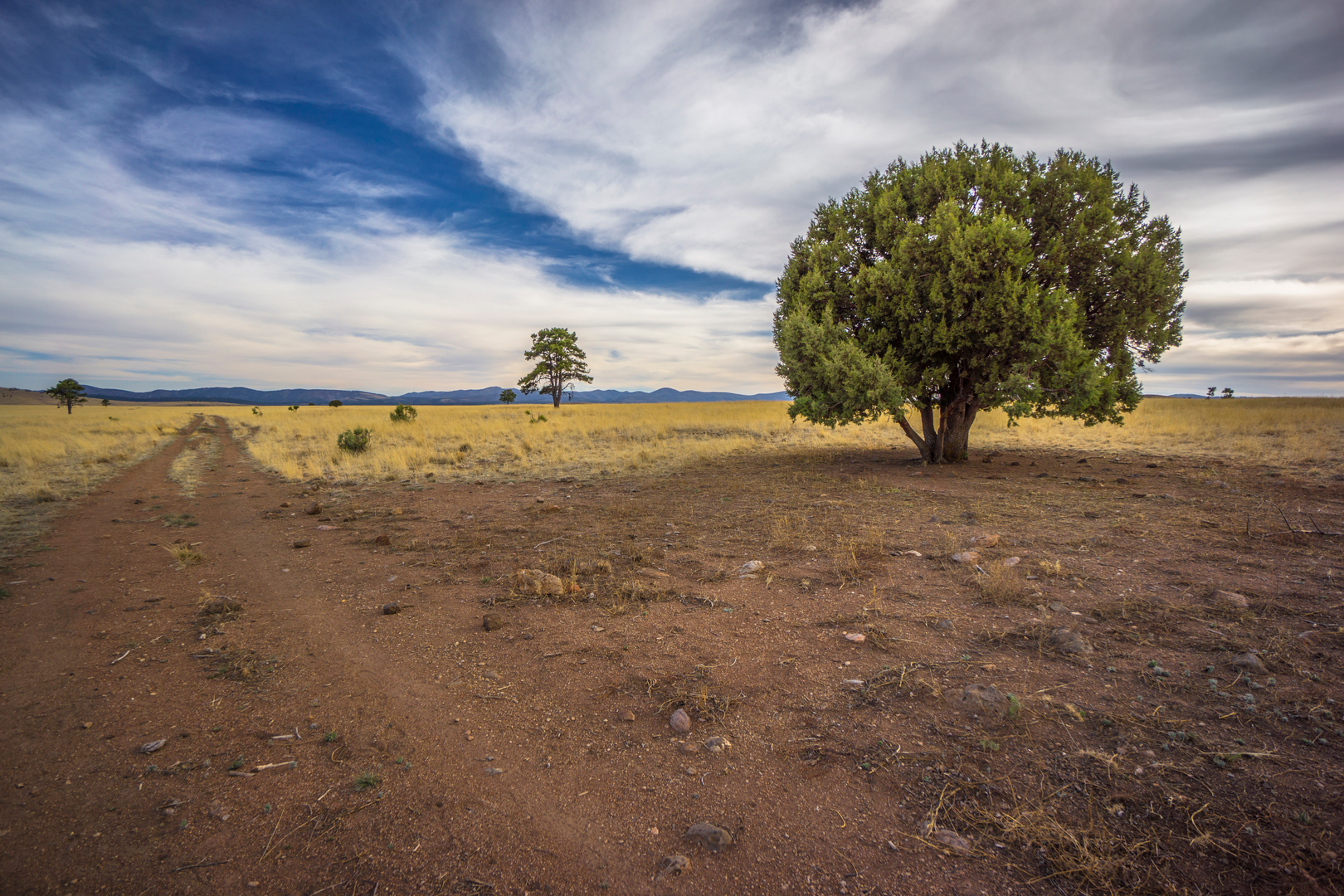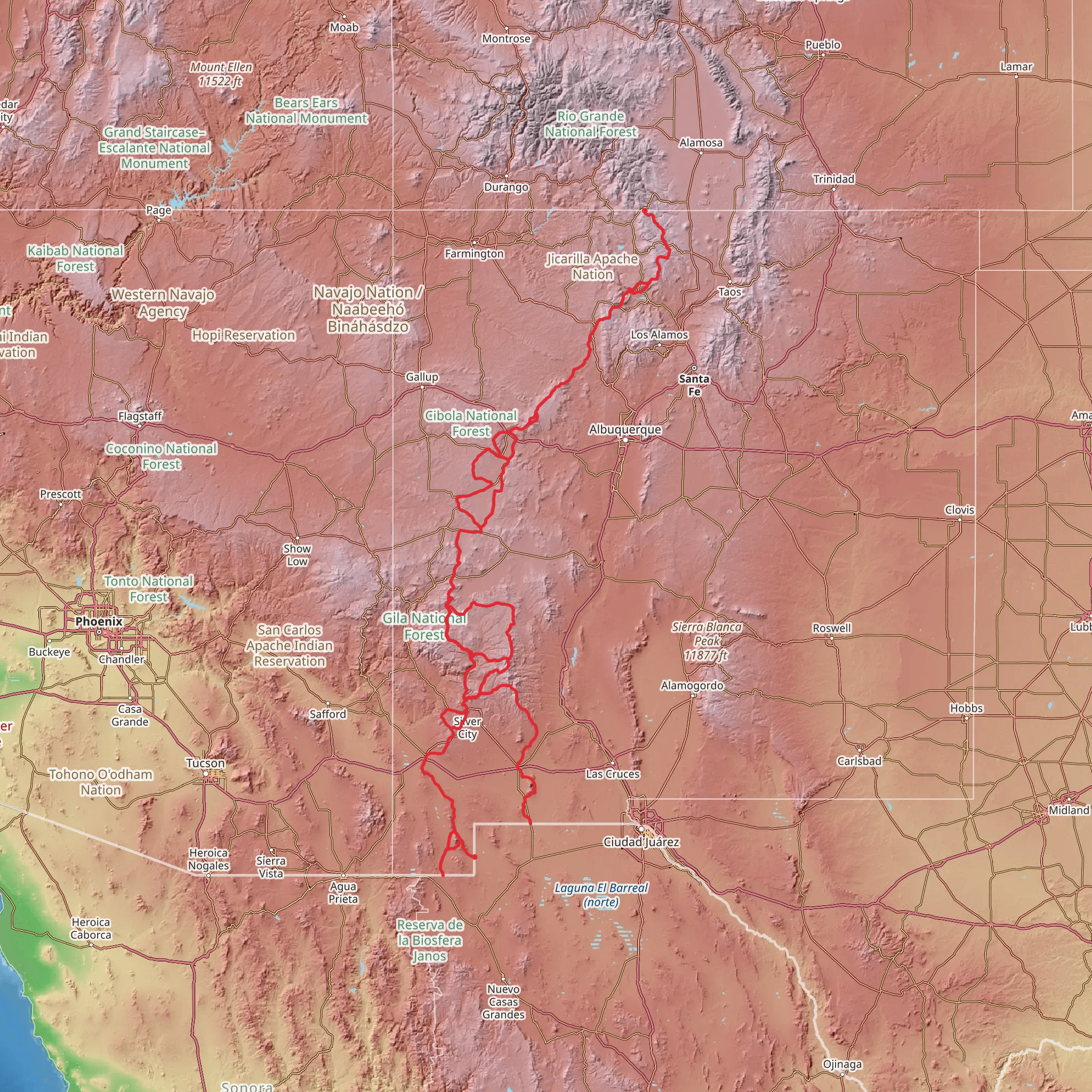Download
Preview
Add to list
More
1282.9 km
~68 days
18749 m
Multi-Day
“Traversing the CDT in New Mexico is an epic journey through diverse landscapes rich in history and natural splendor.”
Spanning approximately 1283 kilometers (797 miles) and with an elevation gain of around 18,700 meters (61,352 feet), the Continental Divide Trail (CDT) through New Mexico offers a challenging yet rewarding experience for hikers. This section of the CDT begins near Hidalgo County, close to the Mexico-United States border, and traverses north through diverse landscapes, including the rugged Chihuahuan Desert and the high peaks of the Southern Rockies.
Getting to the Trailhead
To reach the southern terminus of the New Mexico section of the CDT, most hikers will travel to Lordsburg, New Mexico, which is the nearest town with amenities and public transportation options. From Lordsburg, you can drive or arrange a shuttle to the starting point near Crazy Cook Monument, which is the most commonly recognized southern terminus of the CDT. The exact location is remote, so it's essential to plan your transportation carefully.
The Journey Through New Mexico
As you embark on your hike, you'll immediately be immersed in the stark beauty of the Chihuahuan Desert, with its cacti and hardy shrubs. The trail here is relatively flat, but don't let that fool you; the desert presents its own set of challenges, including extreme temperatures and scarce water sources. It's crucial to carry plenty of water and be prepared for the heat.
As you progress northward, the terrain begins to change. You'll encounter the Black Range, a mountainous area that offers a stark contrast to the desert you've left behind. The elevation gain becomes more pronounced here, and you'll find yourself surrounded by pine forests and rugged peaks.
Landmarks and Natural Features
One of the most significant landmarks you'll pass is the Gila Cliff Dwellings National Monument, approximately 200 miles into the trail. This area is rich in history, with well-preserved dwellings that date back to the Mogollon people who inhabited the region over 700 years ago.
Further along, you'll reach the El Malpais National Monument, known for its volcanic features, including lava flows and tubes. The stark, otherworldly landscape here is a highlight for many hikers.
As you approach the northern end of the New Mexico section, you'll enter the San Juan Mountains, part of the larger Rocky Mountains. This area is characterized by high alpine meadows, wildflowers, and the potential to spot wildlife such as elk, mule deer, and black bears.
Wildlife and Flora
Throughout the trail, you'll have the opportunity to see a variety of wildlife. In the desert sections, look out for lizards, snakes, and roadrunners. As you move into higher elevations, the wildlife changes, and you may see larger mammals and a variety of bird species.
The flora along the trail is equally diverse. From the yucca and agave of the desert to the ponderosa pines and aspens of the mountains, the changing ecosystems will be a constant source of wonder.
Navigation and Preparation
Navigating the CDT in New Mexico can be challenging due to its remote nature and sometimes poorly marked trails. It's highly recommended to use a reliable navigation tool like HiiKER to keep track of your location and plan your resupply points.
Preparation is key for this trail. Water sources can be few and far between, especially in the southern desert sections, so plan your water resupply carefully. Weather can also be unpredictable, with the potential for snow in the higher elevations, even late into the spring.
Historical Significance
The region the CDT traverses is steeped in history, from ancient Native American cultures to Spanish explorers and pioneers. The trail itself is part of a larger network that has been used for centuries for migration, trade, and exploration. Hiking the CDT is not only a physical journey but also a walk through the history of the American West.
Conclusion
The Continental Divide Trail through New Mexico is a microcosm of the American Southwest, offering a blend of cultural history, diverse ecosystems, and challenging terrain. Whether you're a seasoned thru-hiker or looking to experience a section of the trail, the CDT in New Mexico is an adventure that will leave a lasting impression.
What to expect?
Activity types
Comments and Reviews
User comments, reviews and discussions about the Continental Divide Trail - New Mexico, New Mexico.
4.73
average rating out of 5
15 rating(s)

